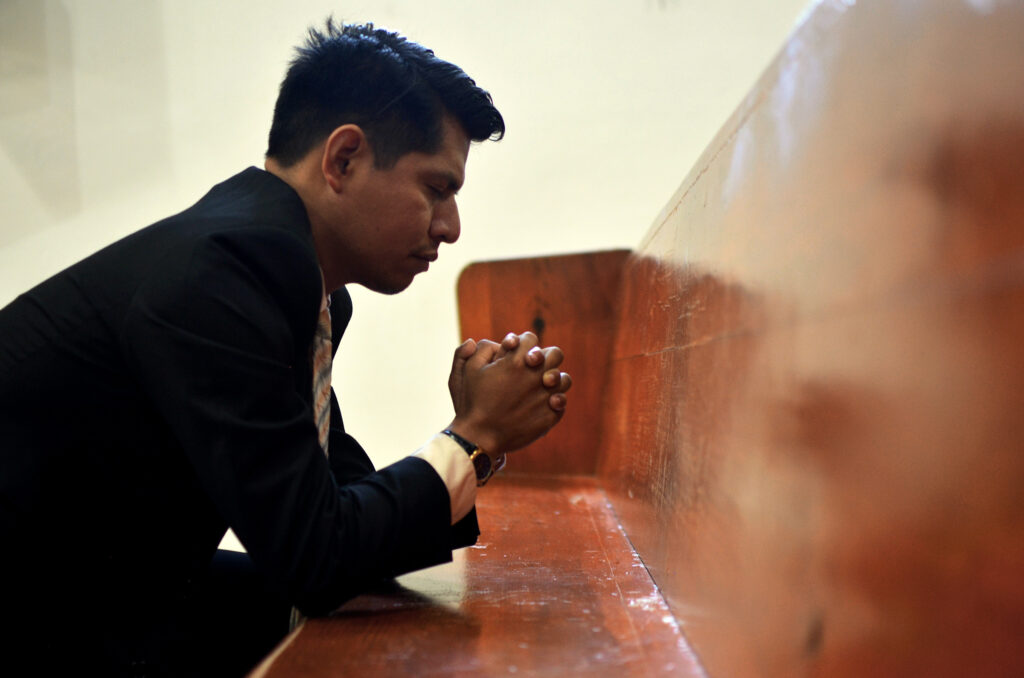“[D]o not be anxious about anything, but in everything by prayer and supplication with thanksgiving let your requests be made known to God. And the peace of God, which surpasses all understanding, will guard your hearts and your minds in Christ Jesus.” (Philippians 4:6-7 ESV)
Modern man is well-acquainted with anxiety. As of 2020, 42.5 million adults in the US were affected by anxiety disorders such as generalized anxiety, obsessive-compulsive disorder, and panic disorder (“Mental Health Statistics And Facts In 2023,” Forbes Health, accessed October 1, 2023).
In response to this crisis of mental health, contemporary society’s approach seeks to pathologize swaths of the human experience. Rather than recognize negative emotions as the natural response to the negativity of life in a fallen cosmos, today’s experts treat them as diseases to be treated.
The Scriptural witness, however, describes humans as psychosomatic beings consisting both of body and soul. Thus, our bodies indeed count the cost of our internalized anxieties, and likewise our bodily state can affect the mind. Yet more often than not, our clinical discussions of anxiety provide cover for what, biblically, we should see as worry.
Little, indeed, is new under the sun. Paul too sought to address the worries of his followers in Philippi. They, of course, had their share of mundane affairs to attend to. Yet in their case, they had also good cause for deeper concern; their beloved apostle had been imprisoned (Philippians 1:7), their missionary Epaphroditus had fallen ill (2:26), false teachers threatened their joy in Christ (3:2, 18), and petty quarrels threatened their unity (4:2). Still, against this backdrop, Paul enjoins them: “do not be anxious about anything” (4:6).
We may be tempted to observe Paul’s lack of nuance in his treatment of anxiety and insert our own qualifications. Yet the faithful reader of Scripture ought to approach the text seeking to have no problem passages for his worldview. We are to receive God’s Word on its face. Paul’s words comport with the general tenor of Scripture, which records some 365 exhortations to “fear not.” The Lord Jesus himself also exhorted us to “not be anxious about your life” (Matthew 6:25), and the Apostle Peter echoes: “[cast] all your anxieties on him, because he cares for you.” Far from failing to consider the force with which worry thrusts itself upon our minds, Scripture calls us to consider the force, instead, of the one who holds all things together by the word of his power (Hebrews 1:3) and governs all things such that they accomplish the ultimate good of his beloved saints (Romans 8:28).
Yet Paul does not expect his readers to put anxious thoughts out of mind by sheer, Stoic force of will. Rather, “in everything,” they are to “let [their] requests be made known to God” (Philippians 4:6). This is to be undertaken with “prayer,” “supplication,” and “thanksgiving.” The teaching is clear: rather than be anxious, the Christian is to commit anything and everything about which he is tempted to worry to prayer. This prayer is to be marked not only by earnest entreaty but also warm gratitude.
Cognitive science is only now beginning to grasp the power of thanksgiving to combat anxiety. Yet the effect of thankfulness is more than psychological. Paul locates ingratitude at the heart of the sinful condition (Romans 1:21). By contrast, Asaph writes that he who offers God an offering—not of bulls or goats, but of thanksgiving—will see his salvation (Psalm 50:23). Genuine gratitude is as much the heart of a true Christian as constant, murmuring discontent characterizes the soul in rebellion against its maker.
Such grateful, petitioning prayer is potent, calling down “the peace of God, which surpasses all understanding” (Philippians 4:7). Far from being irrational, this peace transcends our intellectual faculties. It “guards” not only “hearts” but also “minds,” its basis being not therapeutic but theological: “in Christ Jesus” (v. 7). Filled with the Holy Spirit, the believer’s mind is set upon God and is thus characterized by “life and peace” (Romans 8:6), assured that God is irrevocably and invincibly for him (v. 31).
Just as Christians need beware worldly philosophies that promise quick fixes for sinful worry, we must also avoid happy-go-lucky religiosity. Jesus warns us to expect great sorrows (John 16:33), and Paul himself was often anxious for the state of the churches he had planted (2 Corinthians 11:28). Our Lord himself suffered such anxiety in his approach to Calvary that he sweat great drops of blood (Luke 22:44). Yet in this condition he did not sin, but committed himself to his Father’s loving care.
Likewise, we as believers committed to Christ’s mission should expect countless cares, both monumental and mundane, to buffet our minds at times. Our response in these moments must not to be to give way to craven worry, as though our God had ceased to care for us, but to bring them to him in grateful prayer. Well did the hymnwright Joseph Medlicott Scriven pen: “O what peace we often forfeit, O what needless pain we bear, all because we do not carry everything to God in prayer.”
Prayer:
Heavenly Father,
Thank you for your constant care for your people. You hold all things, and you hold us too. Forgive me for letting worldly worries cloud my trust in you. Fill me with gratitude for your provision, and guard me with the peace that comes from knowing the saving love of Christ.
In Jesus’ name,
Amen.
Prayer Requests:
- Pray for specific needs in your life; God invites us to lay all our requests before him.
- Ask God to fill your household and local church with a spirit of gratitude befitting his overflowing grace.
- Pray for both spiritual peace and abundant provision for missionaries raising support, asking God to keep them from worry as they prepare to serve him abroad.





